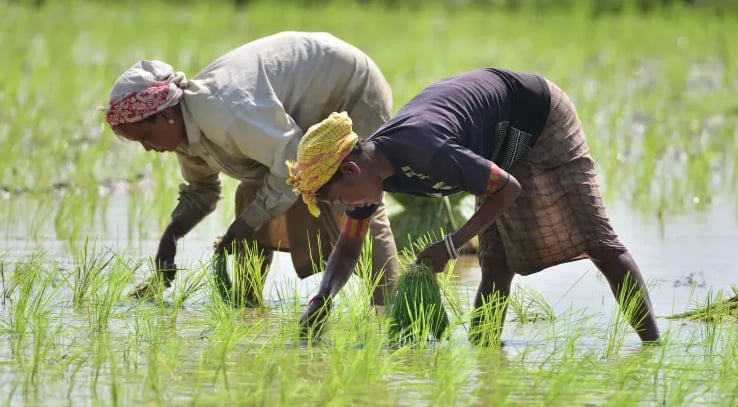June 1, 2025 | 12:37 GMT +7
June 1, 2025 | 12:37 GMT +7
Hotline: 0913.378.918
June 1, 2025 | 12:37 GMT +7
Hotline: 0913.378.918

Women planting rice seedlings in a paddy field in Nagaon district of India’s northeastern state of Assam. India, the world’s largest rice exporter banned the exports of non-basmati white rice on Jul. 20. Photo: Xinhua News Agency
India, the world’s largest rice exporter, banned the exports of non-basmati white rice on Jul. 20, as the government sought to tame surging domestic food prices and “ensure adequate domestic availability at reasonable prices.”
The country accounts for more than 40% of the global rice trade.
“Malaysia appears to be the most vulnerable according to our analysis,” Barclays said in a recent report, highlighting the country’s sizable reliance on Indian rice.
“It imports a substantial portion of its rice supply, and India accounts for a relatively large share of its rice imports,” the analysts wrote.
Singapore is likely to be affected as well, with the report showing that India makes up around 30% of the city state’s rice imports.
However, Barclays noted that Singapore is largely dependent on imports of food in general, not just rice. The country is currently in the midst of seeking exemptions from India’s ban.
Rice prices are currently hovering at decade highs, with El Nino putting further risks on global production in other major Asian rice producers such as Thailand, Pakistan and Vietnam.
Barclays pointed out that Philippines would be the “most exposed to a rise in global rice prices,” given how the weighting of rice is highest in the country’s CPI basket. However, a large bulk of the Southeast Asian nation’s rice imports comes from Vietnam.
Asia is not the only region hit by India’s rice export ban, many African and Middle East nations are also vulnerable.
The markets highly exposed to India’s export restrictions are concentrated in Sub-Saharan Africa and in the Middle East and North Africa (MENA) region, said BMI, a Fitch Solutions research unit. The firm cited Djibouti, Liberia, Qatar, the Gambia, and Kuwait as being the “most exposed.”
India’s withdrawal of non-basmati white rice, comes on the heels of last September’s ban on shipments of broken rice. That means up to 40% of India’s rice exports are now offline, according to BMI forecasts.
This is not India’s first time imposing an export ban on non-basmati rice, but the impact this time could be more far-reaching than before.
In October 2007, India imposed a ban on non-basmati exports, only to temporarily lift the ban and impose it again in April 2008, sending prices almost 30% higher to stand at the record high of $22.43 per hundredweight (cwt).
Prices tripled in the span of six months, according to an agricultural research company, the International Potato Center (CIP).
Samarendu Mohanty, Asian regional director at CIP, noted that India was not a major player in global exports of non-basmati rice back then, and the current ban has “a more far-reaching impact” than 16 years ago.
He added that the magnitude of the ban would depend on how other rice importers and exporters react.
If major rice exporters like Vietnam and Cambodia impose their own form of export restrictions, and significant importers like Indonesia and Malaysia scramble to stockpile, the world will be looking at “possible mayhem in the rice market,” Mohanty said.
He cautioned that it could even be worse than the aftermath in 2007.
“The scale of people impacted by Indian rice ban will be in millions,” said Mohanty, adding that poorer consumers in India’s neighbors, particularly Bangladesh and Nepal will be the hardest hit.
“There is very low probability of this export ban being lifted,” Mohanty said, adding that the ban is here to stay at least until India’s general elections in April next year.
The South Asian nation is currently wrestling with high vegetable, fruit and grain prices, a sticking issue which could hurt the election prospects of Prime Minister Narendra Modi.
India’s inflation rose to 4.8% in June on the back of soaring food prices — still within the central bank’s inflation target of between 2% and 6%.
However, inflation “threatens to come in at 6.5% in July,” HSBC estimated in a report dated July 24.
HSBC economists cautioned that extreme weather events could further put a strain on crop output.
“If shipments fall, there could be global price implications, spilling over into wheat, which is a part-substitute,” the bank noted. The economists said cereal prices are already rising both domestically and globally, with the latter also affected by the Black Sea grain deal.
Wheat prices jumped after Russia withdrew from the Black Sea grain deal.
Under the agreement, Moscow agreed to allow Ukraine to continue to export grain in a bid to prevent a global food crisis following the war on Ukraine.
But the Kremlin pulled out of the deal in July, claiming promises made to Russia under the deal were not met.
(CNBC)

(VAN) Vikas Rambal has quietly built a $5 billion business empire in manufacturing, property and solar, and catapulted onto the Rich List.

(VAN) Available cropland now at less than five percent, according to latest geospatial assessment from FAO and UNOSAT.

(VAN) Alt Carbon has raised $12 million in a seed round as it plans to scale its carbon dioxide removal work in the South Asian nation.

(VAN) Attempts to bring down the price of the Japanese staple have had little effect amid a cost-of-living crisis.

(VAN) Fourth most important food crop in peril as Latin America and Caribbean suffer from slow-onset climate disaster.

(VAN) Shifting market dynamics and the noise around new legislation has propelled Trouw Nutrition’s research around early life nutrition in poultry. Today, it continues to be a key area of research.

(VAN) India is concerned about its food security and the livelihoods of its farmers if more US food imports are allowed.